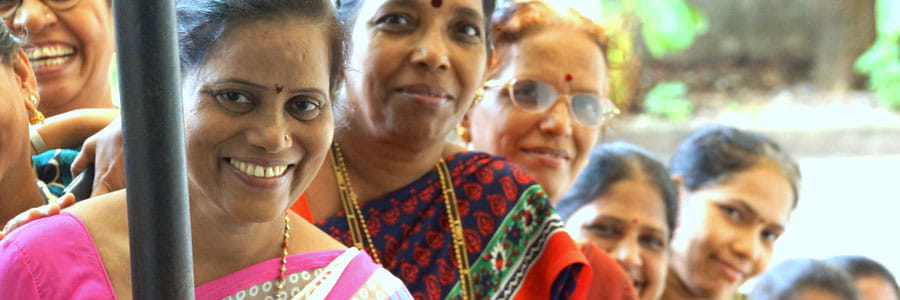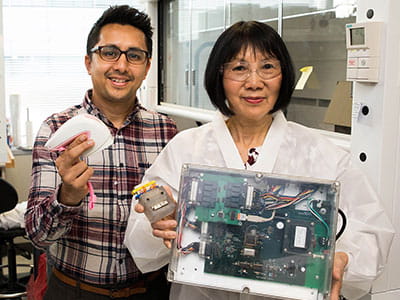Mihir Shah ’00 and Wan Y. Shih, Professor, BIOMED

Early in the new millennium, two women’s lives intersected in a way that led to a significant breakthrough in early diagnosis of breast cancer, especially in places where women have minimal access to modern healthcare. Those women never met, but they shared survival of a life-threatening disease and a connection to Drexel University’s donor-fueled commitment to multidisciplinary research with real-world applications.
Close Call Inspires Innovation

In 2008 Wan Y. Shih, a physicist and professor in the School of Biomedical Engineering, Science and Health Systems, almost skipped the biopsy ordered by her doctor when something suspicious showed up on her mammogram. Thanks to a colleague’s insistence, she went, her breast cancer was discovered early, and treatment was successful.
Inspired, Shih built a team including Wei-Heng Shih, professor of materials science in the College of Engineering, and Ari Brooks, a former professor at the College of Medicine. With philanthropic support from the Wallace H. Coulter Translational Research Program at Drexel University and other sources, Shih’s team turned a ceramic sensor technology they had developed into a radiation-free, handheld device that could detect even very small tumors, quickly and painlessly. Although it was a research triumph, their model was a laboratory-based prototype with limited clinical testing. It needed commercial development and distribution.
iBreastExam is a tool that can save lives and revolutionize breast cancer screening in many countries.
Making the Leap From Urban Laboratory to Rural Village
Elsewhere in the world, the mother-in-law to-be of Drexel electrical engineering graduate Mihir Shah also received a breast cancer diagnosis. She underwent chemotherapy and attended her daughter’s wedding to Shah.
The grateful groom couldn’t help thinking about the millions of women who find out far too late that they have the disease. His research showed that more than 90 percent of women in developing countries have no access to breast cancer screening. Late diagnosis contributes to a lower survival rate.
By 2010, Shah had founded UE LifeSciences Inc., a medical device company based just blocks from Shih’s Drexel lab. Shah and colleague Matthew Campisi licensed the Drexel team’s technology and turned the original design into the device they call Intelligent BreastExam or iBE. This handheld, battery-operated, wireless machine allows health care workers to perform accurate, non-invasive breast exams in five minutes; it also reports and stores the results quickly, through a mobile phone app.
Today, iBE is inexpensive, easy to use and sensitive enough to differentiate cancers from non-cancerous lumps. Shih says iBreastExam can even pick up cancers that are missed by mammography. The device is has been used to examine more than 350,000 women in 12 countries, including India, Mexico, Nepal, Myanmar, Oman and Botswana, and there are plans to expand to Southeast Asia and Africa. It has received press attention in the New York Times, Forbes.com, and has been recognized by the World Health Organization’s compendium of innovative health technologies for low-resource settings.
While noting that the device is not a panacea, Shah says that iBE is "a tool that can save lives and revolutionize breast cancer screening in many countries."
Support BIOMEDContact Us
215.895.2612
giving@drexel.edu
Mail your gift to
Drexel University
P.O. Box 8215
Philadelphia, PA 19101-9684